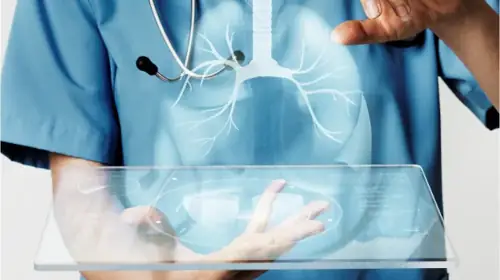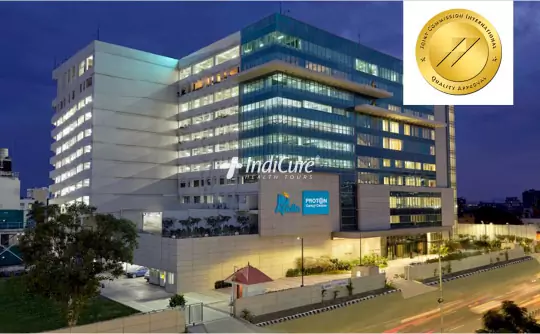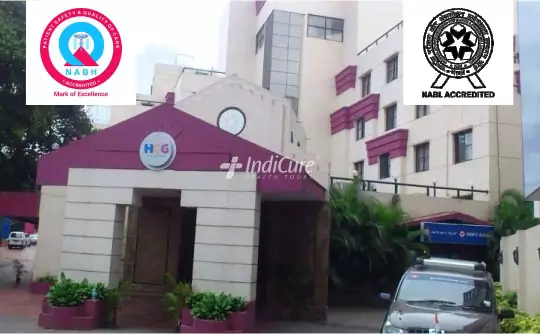

The total cost for lung cancer treatment in India generally includes several components. Here's a breakdown of expenses that you can expect:
| Procedure | Cost (Range in US $) |
|---|---|
| Investigations | 500-1,000 |
| Chemotherapy | 300-2,000 per cycle |
| Radiotherapy | 3,500-5,500 |
| Surgery | |
| Wedge Resection | 2,500 |
| Lobectomy | 4,000 |
| Pneumonectomy | 5,000 |
The lung cancer treatment cost in India varies based on several factors, including the type of treatment required, your specific medical condition, the hospital, and the city where you receive care. Depending on your diagnosis, you may need surgery, chemotherapy, or both, or a combination of chemotherapy, radiotherapy, and surgery. As a result, the total cost will fluctuate based on the treatment plan tailored to your needs.
The cost quoted above in the cost table is indicative and should not be taken as the final cost of the lung cancer treatment cost in India. The final cost can be ascertained after the oncologist has evaluated the patient. The cost in Indian Rupees can vary based on the exchange rate.
Often, the most effective approach to treating lung cancer involves a combination of treatments. Surgery, whether performed alone or alongside other treatments, is commonly employed. The costs associated with each treatment may vary. IndiCure advises consulting with our expert oncologists in India to explore and understand all available options.
The overall lung cancer treatment cost in India depends on the number of chemotherapy or radiation therapy cycles that a patient has to undergo. In some patients, the oncologists might advise giving more than a couple of cycles of chemotherapy or radiation therapy to kill the cancerous cells.
A significant expense when considering lung cancer treatment in India is the oncologist's fee. IndiCure Health Tours connects you with board-certified and highly skilled oncologists who have a track record of successful surgeries. Although the fee may vary depending on the oncologist's experience, you can rely on IndiCure to recommend professionals who prioritize your safety and ensure excellent outcomes for your lung cancer treatment in India.
Selecting an accredited medical facility with experienced and qualified staff is essential for effective lung cancer treatment in India. Major cities in India generally provide advanced medical facilities and more seasoned oncologists, which may lead to higher costs. IndiCure Health Tours recommends opting for cancer treatment centers in these larger cities to ensure high-quality care and patient safety of our overseas guests.
Pre-surgical and treatment costs vary depending on the cancer stage and the patient's overall health, influencing the number and type of tests and treatments needed. Post-treatment expenses may involve prescription medications and follow-up consultations.
At IndiCure, we consolidate most of the expenses for your lung cancer treatment in India to provide you with an inclusive and cost-effective package tailored to your budget and individual requirements. After receiving medical reports, your case manager will provide an estimated cost based on a discussion with the oncologist.
The final lung cancer treatment cost in India can however be confirmed after your face-to-face consultation with the oncologist.

We Help you Choose the Right Treatment, Surgeon & Hospital

We Arrange Video/Telephonic Consultation with the Surgeon

We Assist you with Visa & Accommodation

We Receive you at the Airport and Drop you at Hotel/Hospital

We Assist you the at Hospital & Provide Post Operative Support
IndiCure Health Tours offers exclusive savings on your medical travel to India. We partner with top hospitals to negotiate special rates, ensuring you get the best possible price on your healthcare when you travel with us.

Here is a set of questions you should consider asking before commencing your medical tour for lung cancer treatment in India.
Prepare to answer questions about your:
Cancer happens when the cells in a part of the body grow abnormally faster and in an uncontrolled manner due to mutation in the DNA of the cells. Similarly cancer in the lungs happens when the cancer cells invade the lungs and destroy the healthy cells of the lungs thereby hindering the normal functions of the lung. Cancer in the lungs may take several years to develop.
At times, these cancer cells may spread to affect other parts of the body through metastasis. Lung cancer often goes unnoticed in the early stages as it hardly produces any symptoms. Advanced cancer may show symptoms like blood in the cough, persistent cough, chest pain, hoarseness in the voice, recurrent chest infection etc. There are two main types of lung cancer:
Small cell lung cancer starts in the air tubes that advances to the bronchi and affects the lung tissue. It produces large tumors that can spread faster to other parts. This is usually seen in chronic and life time smokers. It has two subtypes:
Makes up 85% of all lung cancers which are slow-growing and larger and have the following types;
The staging of lung cancer is essential in order to know the extent of the spread of the disease and make the treatment plan accordingly. The lung cancer is thus staged as:
Following are the risk factors that are responsible for developing lung cancer.
Lung cancer symptoms do not always appear until the disease has progressed. Some people, on the other hand, experience symptoms early on. These are some of them:
Coughing, shortness of breath, chest pain, exhaustion, and/or unintended weight loss are all indicators of advanced lung cancer. Bone discomfort, headache, muscular weakness, and/or eyelid drooping are signs and symptoms indicating the cancer has spread to other parts of the body.
If you are suffering from any of the aforementioned symptoms mentioned above, you should see a doctor immediately who will advise you on various tests for the correct diagnosis. If you are diagnosed with lung cancer, the treatment should be started without any delay.
Treating lung cancer is very challenging. To regulate the survival rates, it is essential to know the stage of the disease. The treatment for lung cancer can either be curative in which the interventions are done to control the growth of the cancer, or it can be palliative, which aims to improve the quality of life by managing pain and associated symptoms.
Surgery to treat lung cancer is considered the gold standard which is performed to excise the cancerous tumor and the surrounding lung tissue to cure the patients when the disease is particularly localized. Initially, only traditional open surgeries were performed for resection of the tumor. The recent advances in surgical procedures have made minimally invasive surgery the primary option for surgical resection of lung cancer. The following procedures are now being performed by the surgeons using VATS which is video-assisted thoracic surgery and robotic surgery as well.
These procedures are done using minimally invasive VATS technology that involves the insertion of a thin tube that is attached to the thoracoscope (camera) and the specialized small surgical instruments to carry out the required surgery. The thoracoscope provides images on the monitor using which the surgeon removes the tissue with more ease and precision.
It comprises specialized drugs that destroy the growing cancer cells. The drug may be injected intravenously or can be taken orally in the form of pills.
This uses high-powered energy beams like X-rays or protons to kill the cancerous cells. It can either be used as a sole treatment or can be combined with chemotherapy with or without the surgery. Following radiation therapy, most of the patients are relieved from the pain, obstruction in the airways, shortness of breath etc. It can be done using,
The innovation in radiation therapy is radiosurgery, which is used in very limited patients where tumors are small but undergoing surgery may prove harmful. In such cases, surgery is done using radiosurgery, in which high doses of radiation are focused precisely on targeted cells in the lungs to kill the cancer cells without harming the nearby tissues.
Surgery is indicated in most cases of lung cancer. Depending on the size, location and extent of spread of the tumor, either wedge/ segmental resection, lobectomy or Pneumonectomy procedure is performed to excise the tumor and tissues surrounding it. These procedures are now being performed using the minimally invasive VATS approach.
The surgery is done under general anesthesia. The surgeon makes several 2-4cms small incisions on the chest between the ribs.
Using the thoracoscope (camera) that is put inside the chest cavity, the surgeon evaluates the cancerous lung tissue by looking at the images on the monitor from the camera.
After evaluating with the help of specialized surgical instruments that have been put inside through one of the incisions, the surgeon transects and removes the required amount of tissue from the lung.
Following are the detailed advantages of VATS -
One can experience improvement in quality of life after undergoing the treatment. Moreover, minimally invasive surgery helps patients lead a life with less pain after the surgery, better immunity, and a better chance of normal breathing and comparatively less time of recovery.
Recovery after the surgery to a large extent depends on the type of surgery performed. After a minimally invasive procedure, the patient can be discharged after 3-4 of the surgery and can resume work and normal activities within 4-5 weeks after the surgery.

Chennai
The Apollo Proton Cancer Centre (APCC) is South Asia's and the Middle East's first and only proton therapy centre, as well as India's first JCI-accredited cancer hospital. The APCC includes a completely integrated treatment suite that provides the most advanced surgical, radiation, and medical procedures available. The Centre brings together a remarkable team of clinicians renowned globally in cancer care, in keeping with the Apollo Pillars of Expertise and Excellence.

Bangalore
HCG- HealthCare Global Enterprises Ltd, is the specialized chain of hospitals in cancer care headquartered in Bangalore. Founded by Dr. Ajaikumar, a renowned medical and radiation oncologist with 40 years of experience, HCG has 26 centres across India with its largest facility in Bangalore. HCG Hospital Bangalore is not only the most advanced facility for cancer care in India, it is a Centre of Excellence for the most advanced cancer care and research.
Lung cancer is the second most frequent cancer in the United States, but it is also the deadliest, causing the most fatalities of all malignancies. In the United States, there are estimated to be roughly 228,150 new cases of lung cancer diagnosed in 2019, with 142,670 deaths.
Concern about lung cancer usually arises from an abnormal result on a chest imaging study (chest X-ray or CT scan) or when the illness has progressed to the point of causing symptoms such as coughing, shortness of breath, chest pain, exhaustion, and/or weight loss.
A biopsy, or the removal of cells or tissues from the suspicious lump, is required for diagnosis. Biopsies can be taken using a camera feed through the breathing tubes (bronchoscopy) or with a needle injected into the lung tumor through the skin. If none of these methods work, surgery may be required for a proper diagnosis. The biopsy is necessary for detecting whether or not there is cancer and the form of lung cancer it is.
It can be difficult to choose which treatment is best for you. Consult your cancer specialist about the therapy choices available for your specific cancer type and stage. Each treatment's risks and advantages, as well as any adverse effects, can be discussed with your doctor.
Lung cancer cannot be completely avoided. However, there are certain things you may do to reduce your risk.
Lung cancer has a poorer five-year survival rate (18.6%) than several other common cancers, including colorectal (64.5%), breast (89.6%), and prostate (89.6%). (98.2 percent). Lung cancer cases discovered while the disease is still localized have a five-year survival rate of 56 percent (within the lungs).
Following cancer treatment, your healthcare experts will assist you in understanding what to expect in terms of follow-up care, lifestyle adjustments, and making crucial health-related decisions.
Following therapy for localized or regional lung cancer with the goal of curing the cancer, follow-up testing will be done to verify the cancer does not reoccur. You'll also be evaluated for any adverse effects from the treatment, and medication will be administered to alleviate any linked problems.
Tests will be performed over time to see how the cancer responds to treatment and to keep track of any side effects. These follow-up tests will determine the length of treatment or the necessity to switch therapies.
Lung cancer is one of the most deadly malignancies, killing more people each year than breast, prostate, and colon cancers combined.
As with many other diseases, detecting lung cancer in its early stages, when it is most curable, is crucial to survival. The cure rate for people with tiny, early-stage lung cancer can be as high as 80 percent to 90 percent.
Yes. Lung cancer is most commonly caused by smoking. Lung cancer can also strike persons who have never smoked or who have never been exposed to second-hand smoke for an extended period of time. Other dangers include asbestos, radon, and other substances in the environment. Nonsmokers make up around 10% of lung cancer patients, and they are more likely to have mutations that can be addressed with targeted medicines.
Lung cancer and its therapies can have a variety of side effects that might affect your quality of life as well as your ability to continue therapy. No two people respond to cancer therapy in the same way, and side effects can vary depending on the type of treatment you choose.
Pain, exhaustion, worry, sadness, and weight loss are all common side effects of lung cancer. Evidence-based supportive therapies such as pain management, nutrition therapy, mind-body medicine, cancer rehabilitation, and spiritual support may help patients cope with side effects and complete their treatment.
Surgery, radiation therapy, chemotherapy, and targeted therapy are all among the therapeutic options for lung cancer, each with its own set of possible benefits.
In addition to the lung cancer treatment cost in India, there are several other expenses you should plan for when organizing your trip. These include:
By accounting for these additional expenses along with the lung cancer treatment cost in India, you can create a comprehensive budget and ensure a smooth, comfortable recovery experience.
Enhance your medical journey to India by availing these extra services.
Traveling abroad for medical reasons may be challenging. With our experience of over a decade and working with the best surgeons and top hospitals in India, we help make your medical tour easier and safer for you. We will guide you at every step of the way and make end-to-end arrangements for your surgery, travel, and stay.
Ramandeep Dhaliwal
a month ago
I had great experience having rhinoplasty through Indicure. Dr. Ruchika from Indicure has helped me in finding best plastic surgeon, answering all my questions...
Read More
Joshua Archer
3 months ago
My name is Joshua Archer I'm from New Zealand, bay of plenty, kawerau I opted for the bypass surgery in January 2023 but planned it in advance for 28 September found IndiCure...
Read More
Kera Ren
8 months ago
Absolutely loved my experience with IndiCure - from first inquiring to meeting the surgeon pre op to my follow up post op. The surgeon was extremely approachable...
Read More
Andreana Paul
5 months ago
Had a wonderful experience. Visited India for my plastic surgery. From sending mails, airport pickup, comfortable accommodation and, to smooth hospital appointment booking...
Read More
Brandi Luce
5 months ago
I had the privilege of using Indicure's services for a cosmetic procedure that I had wanted for a long time but had always been apprehensive about. Ruchika helped me...
Read More
Jade M
3 years ago
Indicure Health Tours went above and beyond my expectations. They helped me with every aspect of my journey and were professional, kind and caring. I was...
Read More
The content on the website (www.indicure.com) is intended to be general information and is provided only as a service. All photographs on our website of before and after results are examples only, and do not constitute an implied or any other kind of certainty for the result of surgery.
Learn about IndiCure Health Tours' comprehensive editorial policy that strives to deliver trustworthy, helpful, relevant, accurate and people-first content on medical tourism in India.
It is not medical advice and should not be taken as medical advice. It should not be used to diagnose or treat a health condition and is in no way meant to be a substitute for professional medical care. You are advised to see a surgeon in person to assess what surgery may or may not accomplish for you.
It is also important to keep your expectations realistic and to understand that all surgical procedures carry risks and should never be taken lightly.